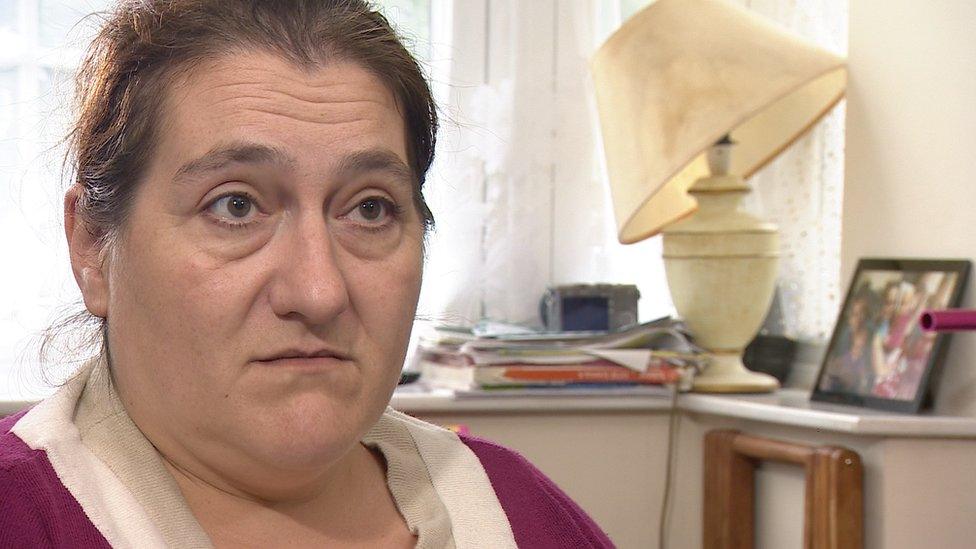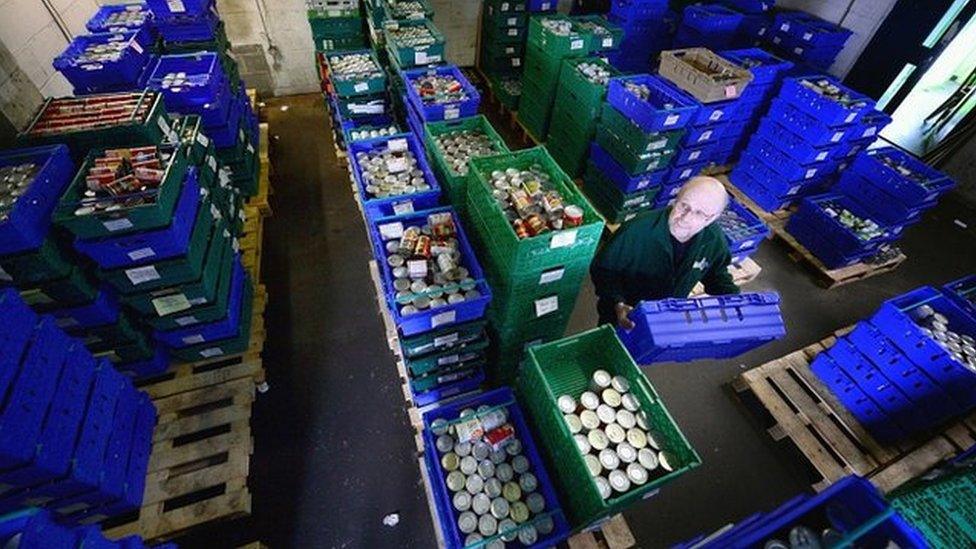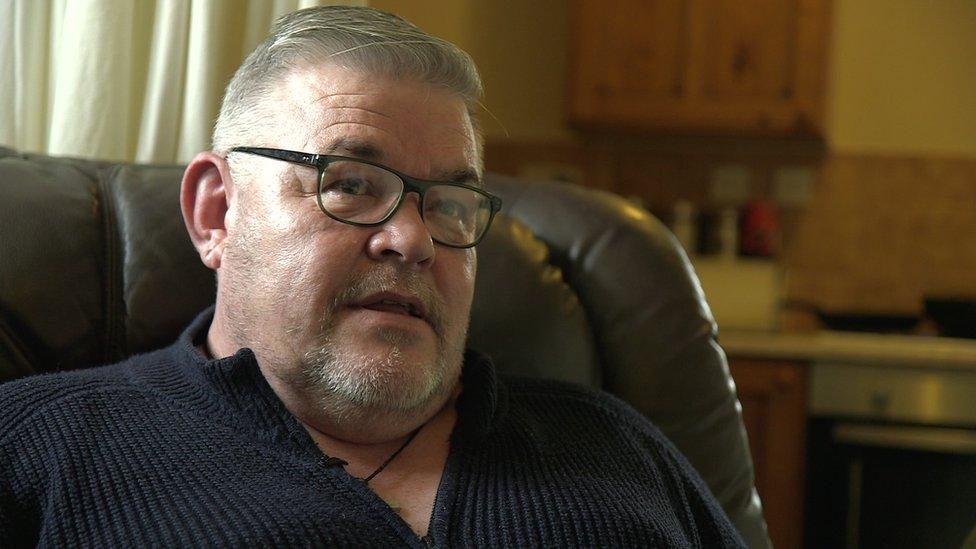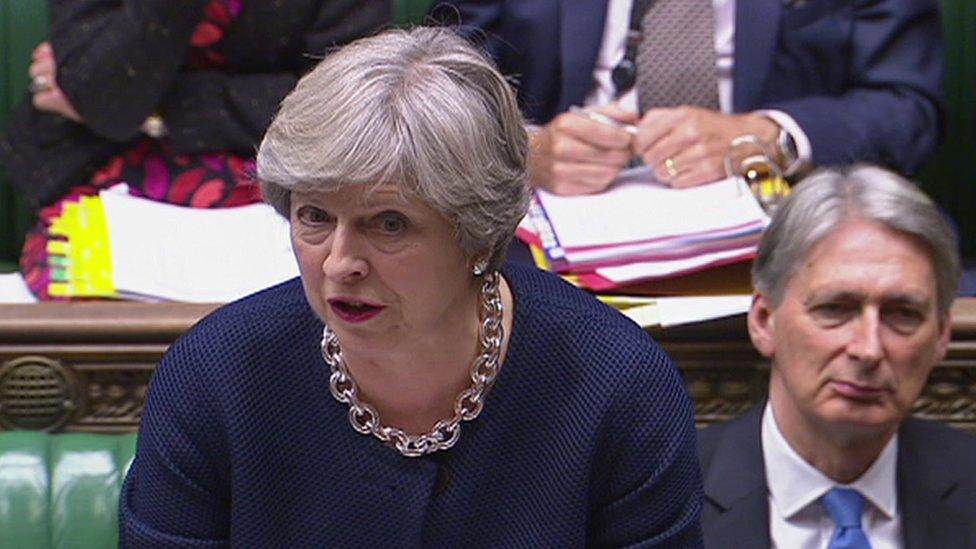Universal credit: My five-year-old searched bins for food
- Published

Anna says she had to visit a food bank after the changes to her benefits left her without any money.
MPs voted overwhelmingly on Wednesday to back a Labour demand for the controversial universal credit scheme to be put on hold but Tory MPs abstained. The Victoria Derbyshire programme has been told some people are being left near-destitute due to flaws in its design.
Without any income for two weeks, Anna was unable to buy food for her five-year-old daughter.
She was waiting for her first instalment of the new benefit.
"Last weekend her last food was school dinners. On Saturday we were walking down the street and she was searching in bins for food, she was starving. She was ripping McDonald's bags to see if there were any chips or anything on the floor. It was awful, broke my heart," she says.
"You take her to bed but her tummy's rumbling. You're just giving her water but she wants food and you can't. She had no food Saturday, Sunday, went to school really, really, hungry."
Anna, from Hammersmith in west London, says she was told to apply online and the first payment would take up to three months to arrive. This was despite the government's expectation that claimants should be paid within six weeks - a target which has itself attracted criticism.
The government says universal credit, which rolls six working-age benefits into a single payment, is designed to make the system simpler and ensure no-one faces a situation where they would be better off claiming benefits than working.
Anna says all of her current benefits were stopped - child benefit, child tax credit, income support, council tax and housing benefits - whilst she waited for them to be grouped under the new system.
Food banks
Senior Labour backbencher Frank Field told the Victoria Derbyshire programme claimants were being "pushed into destitution". He called on the government to temporarily halt the "disastrous" roll-out.
"What we're seeing is increased numbers who are hungry, increased numbers of people who can't pay their rent, and an increase in the number who are without fuel or light in their houses… those numbers [of people in destitution] are rising," he said.

A volunteer packing items for a food bank
Anna says she had to go to a food bank for supplies - otherwise they would still be hungry.
"I can't go to the shop and steal. It's awful. I can't keep asking neighbours for food, I shouldn't have to live like this," she says.
"I don't know if I am going to still have my house, as I need to pay my rent, my council tax is due. What do I do next? Beg on the street to get some milk and bread?"
The Trussell Trust says its network of 400 food banks may be unable to cope with the rise in demand resulting from the introduction of universal credit.
"We're genuinely worried that with the combined demands of winter and [the fallout from universal credit] we might not be able to feed everyone who comes through our doors," says Gareth Lemon, from the charity.
'On my knees'
The government has said anyone in financial distress can apply for advance payments. But these payment are only a type of loan, which claimants have to pay back from subsequent instalments.
For some, the requirement to pay back an advance, has itself resulted in them slipping into debt.

Brendan said his sisters helped him buy food after problems with his benefit payments
Brendan, 51, from West Yorkshire, who has a range of disabilities and is awaiting bariatric surgery, says the failure to be paid the housing element of universal credit has left him thousands of pounds in arrears and facing eviction.
He took an advance while waiting for his first instalment but is now paying that back, exacerbating his debt problems.
"It probably lasted me about two weeks and then left me with nothing. Then you're hoping that what you have in is enough, which it wasn't. I've got a good family who have helped me out a lot. Without my sisters I'd be absolutely on my knees," he says.
Brendan says he went without food for three days, until his sister took him shopping and gave him some money. "She said, 'If you're ever like this again, phone me'. But I won't because it's embarrassing," he adds.
"I've never struggled like this before in my life I've never been in this situation where I could lose my home. I'll die on those streets if I do get evicted, I don't know what I'll do. I don't know where to go for help."
'Really significant'
Ed Boyd, managing director at the Centre for Social Justice, which designed the policy, insisted that the government should be congratulated for introducing universal credit, saying that it is far better than the system it replaces. He said the old system disincentivised work and trapped people on benefits.
"When universal credit is fully rolled out you will have 250,000-to-300,000 more people in work and the effect this will have on families across the country, taking people out of poverty, is really significant," he says.
The Department for Work and Pensions says its latest data, from last month, indicates 81% of new claimants were paid in full and on time at the end of their first assessment while 89% received some payment.
Cases of non-payment, it said, were due to claimants either not signing paperwork, not passing identity checks or facing "verification issues," such as providing details of their earnings, housing costs and childcare costs.
Watch the Victoria Derbyshire programme on weekdays between 09:00 and 11:00 on BBC Two and the BBC News Channel.
- Published18 October 2017

- Published13 May 2024
